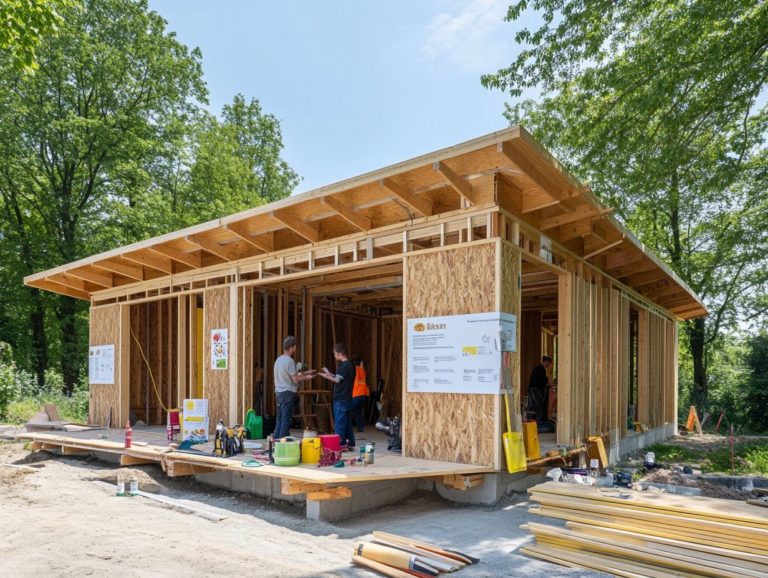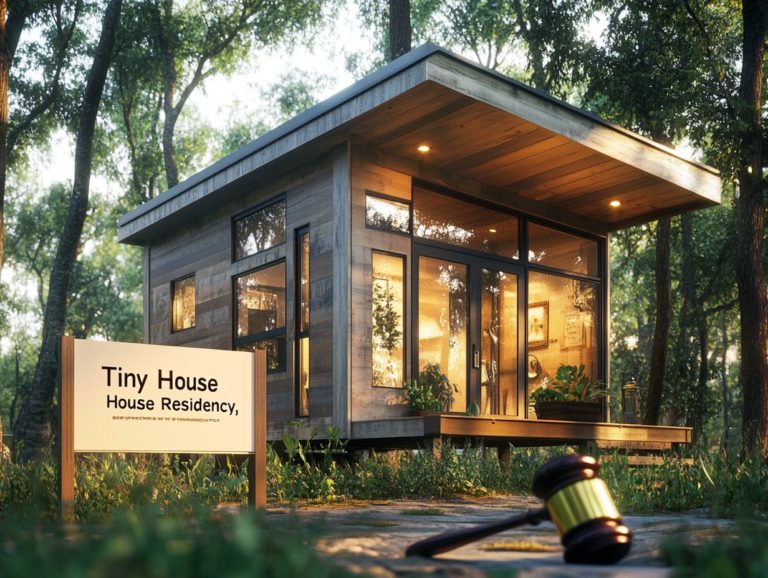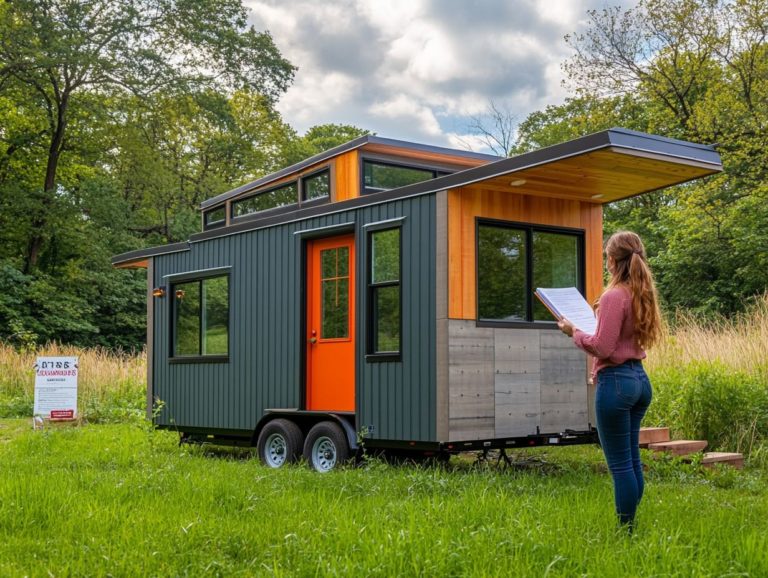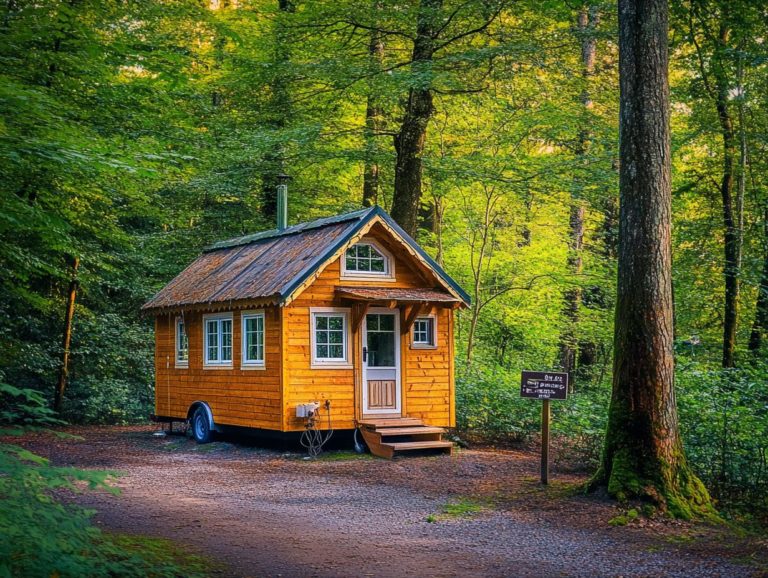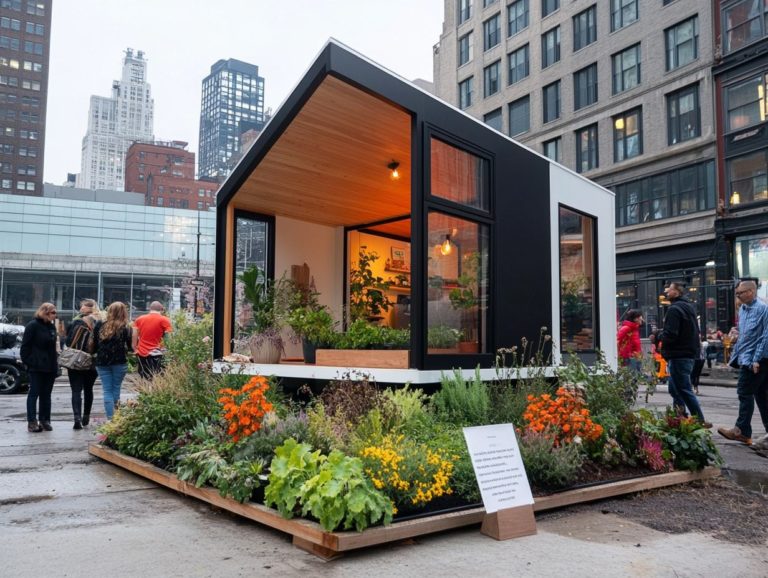Understanding Legal Obligations for Tiny House Owners
Tiny houses captivate your imagination with a minimalist lifestyle emphasizing sustainability and financial freedom. However, this trend also involves complex legal considerations, including zoning laws and building codes.
This article delves into what truly defines a tiny house, the myriad benefits of embracing this lifestyle, and the essential legal obligations necessary for compliance while you enjoy the experience.
Jump in and unlock the secrets to maximizing your tiny house adventure today!
Contents [hide]
- Key Takeaways:
- What is a Tiny House?
- Benefits of Living in a Tiny House
- Legal Considerations for Tiny House Owners
- Insurance and Tax Implications
- Navigating Legal Obligations
- Frequently Asked Questions
- Wondering about the legal obligations for tiny house owners in the United States?
- Do you need a building permit for your tiny house?
- Can you legally live in a tiny house full-time?
- Are there specific safety requirements for tiny houses, especially regarding the International Residential Code?
- Do you need insurance for your tiny house, including options from advocacy groups focused on the tiny house movement?
- What are the tax implications of owning a tiny house?
Key Takeaways:
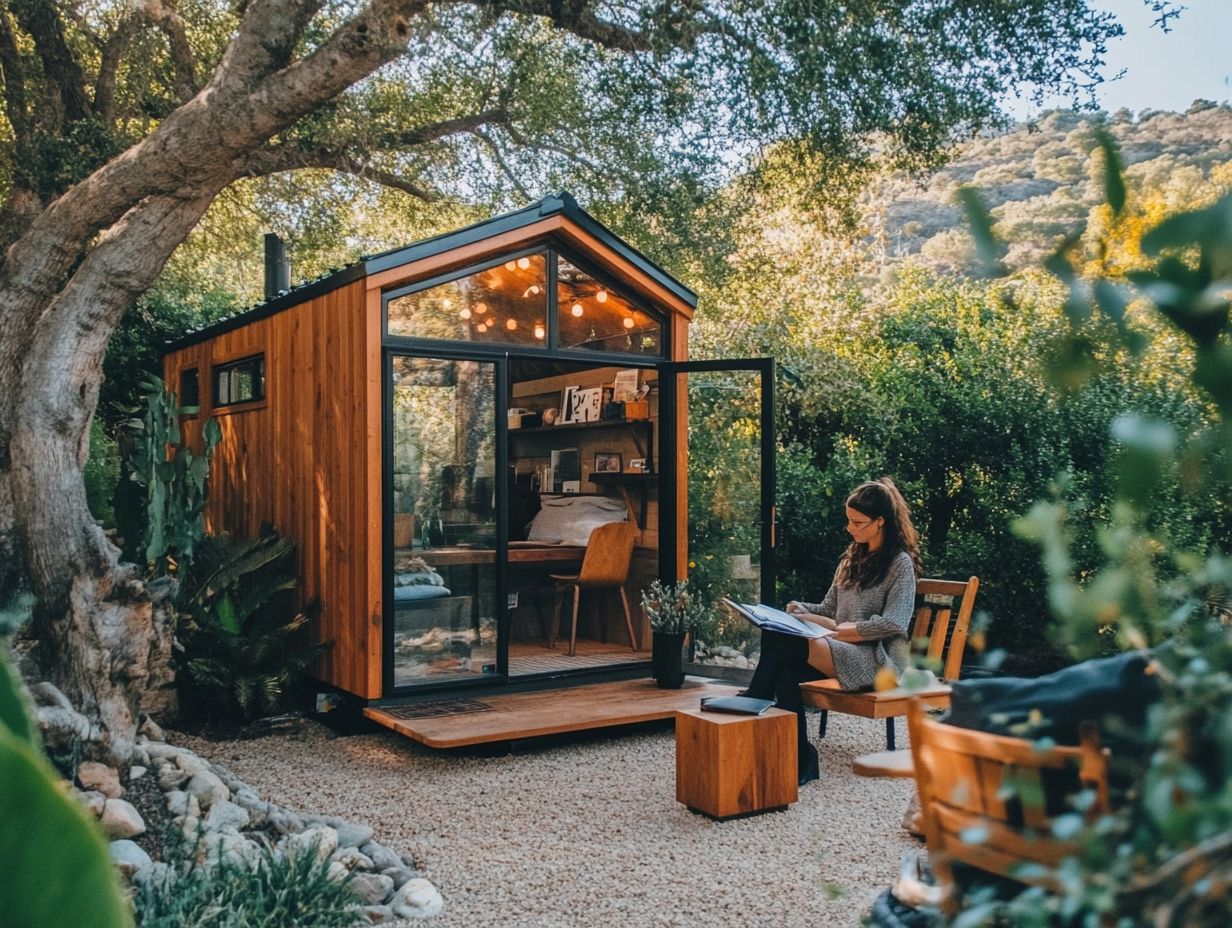
- Tiny houses are homes typically under 400 square feet, offering affordability and sustainability benefits.
- Know zoning laws, building codes, and how to secure permits and insurance. These steps keep you legally safe as a tiny house owner.
- Research, communicate with local authorities, and seek professional guidance to navigate your legal obligations.
What is a Tiny House?
A tiny house is a thoughtfully designed, compact dwelling that highlights a minimalist lifestyle while maximizing essential living spaces within a modest square footage, typically ranging from 100 to 400 square feet.
This movement has garnered considerable popularity in the United States, especially among environmentally conscious individuals and minimalist homebuyers seeking affordable housing options. Local governments are also taking notice as they aim to tackle urban density challenges and housing shortages.
Defining the Concept
The concept of tiny homes centers around a minimalist lifestyle that champions sustainable living through the smart use of space.
By embracing the tiny house movement, you are invited to reevaluate your relationship with material possessions. This leads to a simpler yet more fulfilling way of life. This philosophy encourages environmental responsibility via reduced energy consumption and smaller ecological footprints, while also nurturing a stronger sense of community. Understanding tiny house homeowner associations can further enhance your experience in this lifestyle.
Living in compact spaces sparks your creativity, as you discover innovative solutions to everyday challenges, transforming constraints into opportunities. By prioritizing experiences over belongings, you cultivate deeper connections with others, revealing that true happiness often resides in the richness of life rather than in the abundance of things.
Benefits of Living in a Tiny House
Living in a tiny house presents a wealth of advantages, such as affordability, sustainability, and a significantly reduced environmental footprint. This makes it an appealing choice for individuals and families seeking alternative housing solutions that align with their values and lifestyles.
Environmental and Financial Advantages
Tiny homes offer you both environmental and financial benefits, requiring fewer resources to build and maintain. This leads to a smaller carbon footprint and reduced living expenses.
By designing with efficiency and using sustainable materials, these compact dwellings minimize energy consumption, helping you preserve natural resources while lowering your utility bills. The reduced need for extensive furnishings and appliances not only simplifies your living space but also translates into significant savings on mortgage costs.
Embracing a simpler lifestyle can foster a deeper sense of community and connection with nature, making tiny living an enticing choice for those looking to harmonize sustainability with economic savvy.
In essence, choosing a tiny home allows you to invest wisely in your financial future while also contributing positively to the planet’s well-being.
Ready to embrace tiny living? Start your journey today while keeping understanding tiny house zoning laws in mind!
Legal Considerations for Tiny House Owners
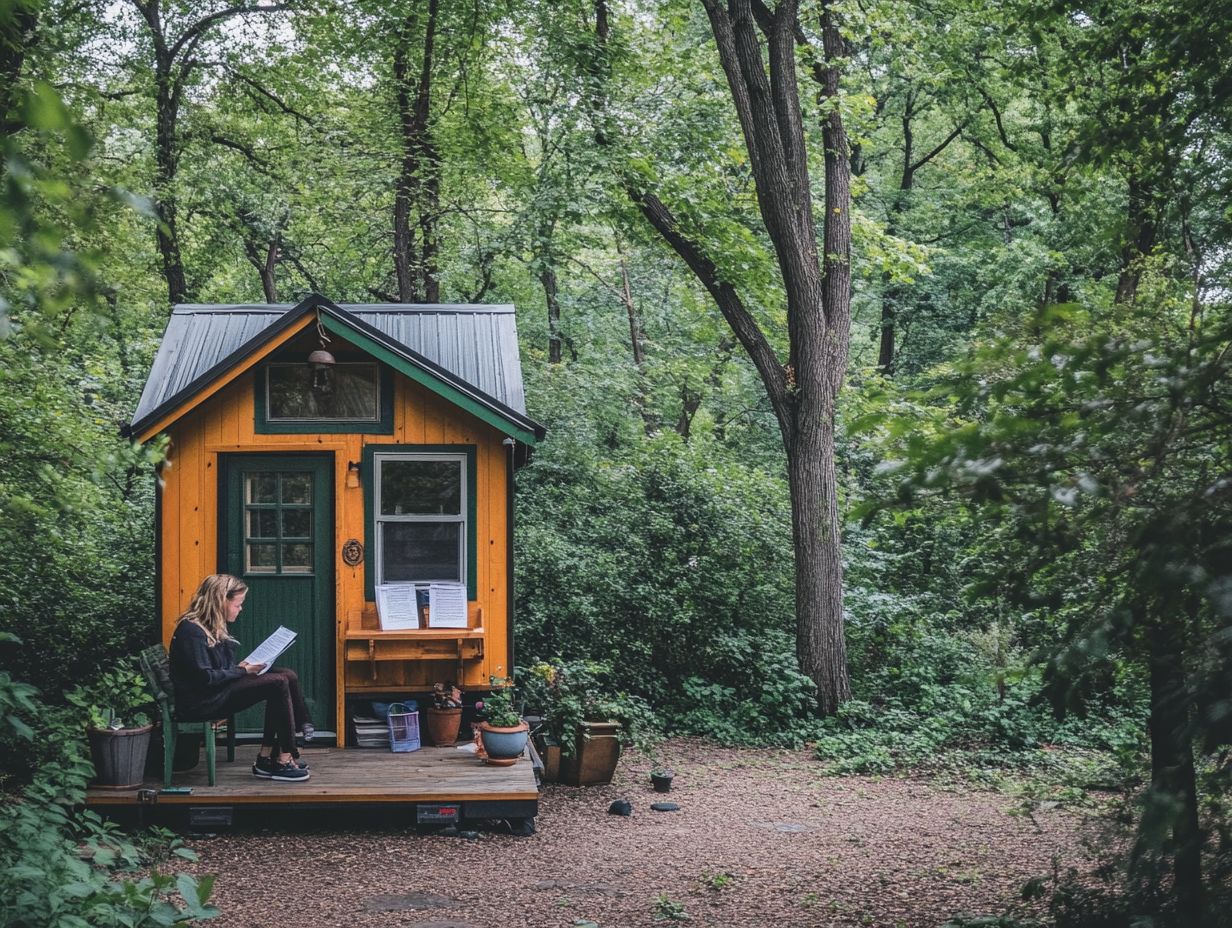
Navigating the legal landscape as a tiny house owner requires understanding various local rules and building standards. These can differ based on local government policies and your property boundaries.
Familiarizing yourself with these rules is essential for compliance and informed choices about your living space.
Zoning Laws and Building Codes
Zoning laws and building codes determine where you can place your tiny home and how it should be built. As a tiny home owner, you often face a maze of local legal requirements.
These rules can vary widely by region. Some areas embrace tiny homes as solutions to housing shortages, while others enforce strict size limits or restrict where they can be located.
Ensure your home meets construction standards and complies with zoning classifications, which may change over time. Staying informed about local policies helps you advocate for rules that support sustainable housing.
Understanding these laws influences the feasibility and success of your tiny home journey.
Permits and Regulations
Securing the necessary permits is crucial for tiny home owners. Neglecting this can lead to legal issues that complicate your living experience.
You’ll often need construction and occupancy permits to ensure your tiny home meets local building codes and safety standards. Although the process can seem daunting, it’s vital for enjoying the benefits of tiny living without the risk of fines or evictions.
Groups like the American Tiny House Association actively promote changes that support the tiny home movement. Their efforts simplify the permitting process, helping you navigate regulations more easily.
Insurance and Tax Implications
Understanding insurance and tax implications is essential for tiny home owners. These factors can vary based on whether your home is a permanent structure or classified as an RV.
Being informed empowers you to make decisions that align with your lifestyle and financial goals.
Insuring a Tiny House
Insuring a tiny house can be challenging. Your coverage options depend on whether your home is anchored to a foundation or classified as an RV.
This distinction impacts everything from liability protection to personal property coverage. You may find that traditional home insurance doesn t fit, prompting you to seek specialized plans for mobile residences.
By understanding these nuances, you can make informed choices about coverage that suits your lifestyle and protects your investment from unforeseen events.
Tax Implications of Tiny House Ownership
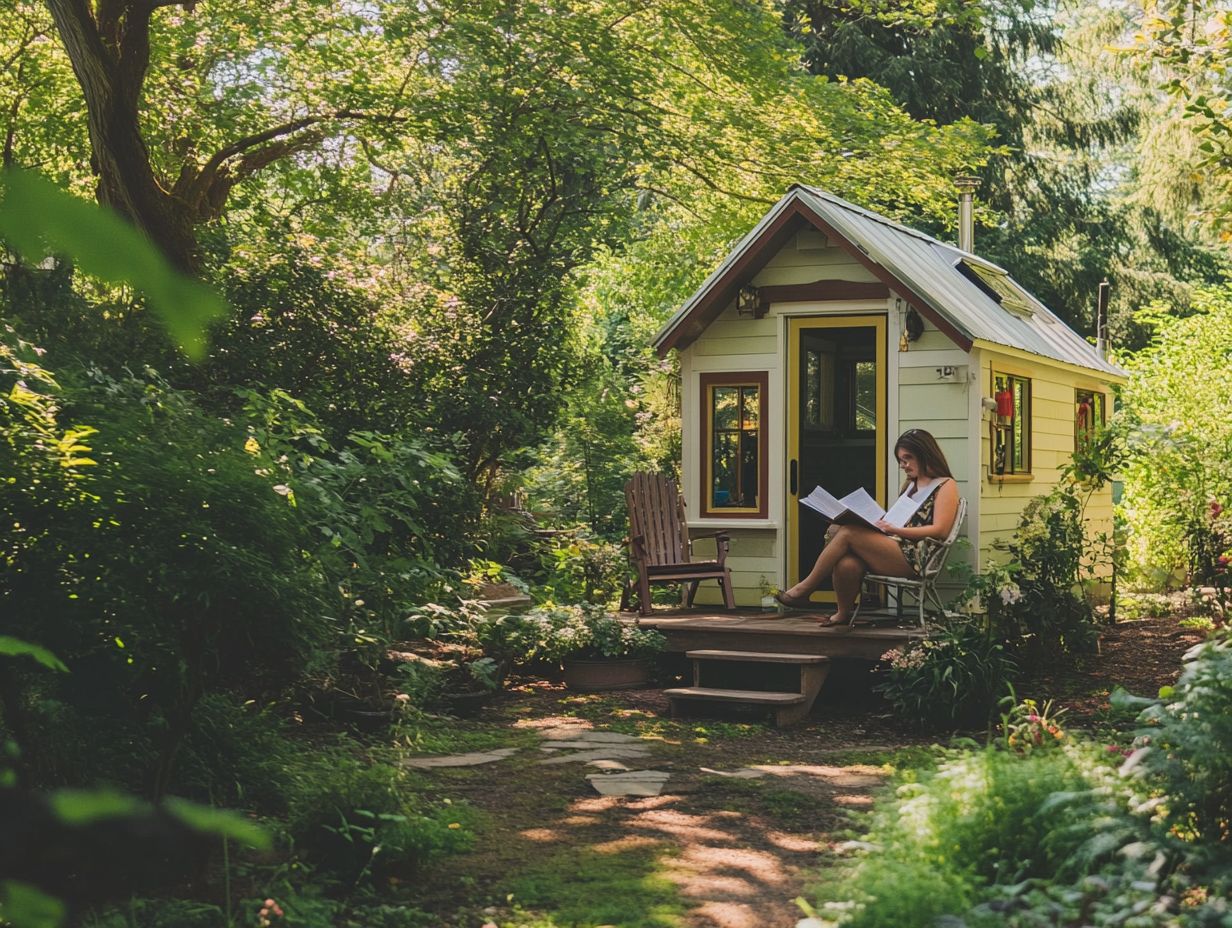
Owning a tiny house comes with specific tax implications that can vary widely based on local laws. These regulations significantly affect both property taxes and the legal classification of your home.
In many places, tiny houses are classified differently than traditional homes. This can lead to different tax rates. For example, if your tiny dwelling is considered a recreational vehicle instead of a permanent residence, it might fall under a different set of taxation rules. To better navigate these complexities, it’s important to understand the legal status of tiny houses.
Local zoning rules can add another layer of complexity. Some areas may impose higher taxes on standalone properties than on those on designated land. It’s vital for homeowners to stay informed, as understanding these nuances, including what to know about tiny house regulations, can lead to significant savings or unexpected costs in the future.
Navigating Legal Obligations
As a tiny house owner, you must navigate a complex landscape of legal obligations. This means grasping the compliance requirements set by local governments. These regulations can impact not only the legality of your dwelling but also its overall livability.
Tips for Staying Compliant
To remain compliant with local zoning regulations and legal obligations, tiny house owners should actively engage with local governments. Seeking guidance on the laws that apply to you can clarify necessary documentation related to zoning regulations.
Building relationships with local officials, attending community meetings, and joining tiny house associations can offer you invaluable insights about the tiny house movement. It’s vital to know specifics like setbacks (the required distance from property lines), utility connections, building codes, and land use classifications that could affect your dwelling.
Keeping an open dialogue with neighboring properties promotes good relations and ensures you stay informed about changes or upcoming legislation that could impact your living situation in tiny house communities.
Frequently Asked Questions
Wondering about the legal obligations for tiny house owners in the United States?
Tiny house owners are subject to the same legal obligations as traditional homeowners, such as paying property taxes and obtaining permits for construction. However, there may be additional regulations and zoning laws specific to tiny houses that must be followed.
Do you need a building permit for your tiny house?
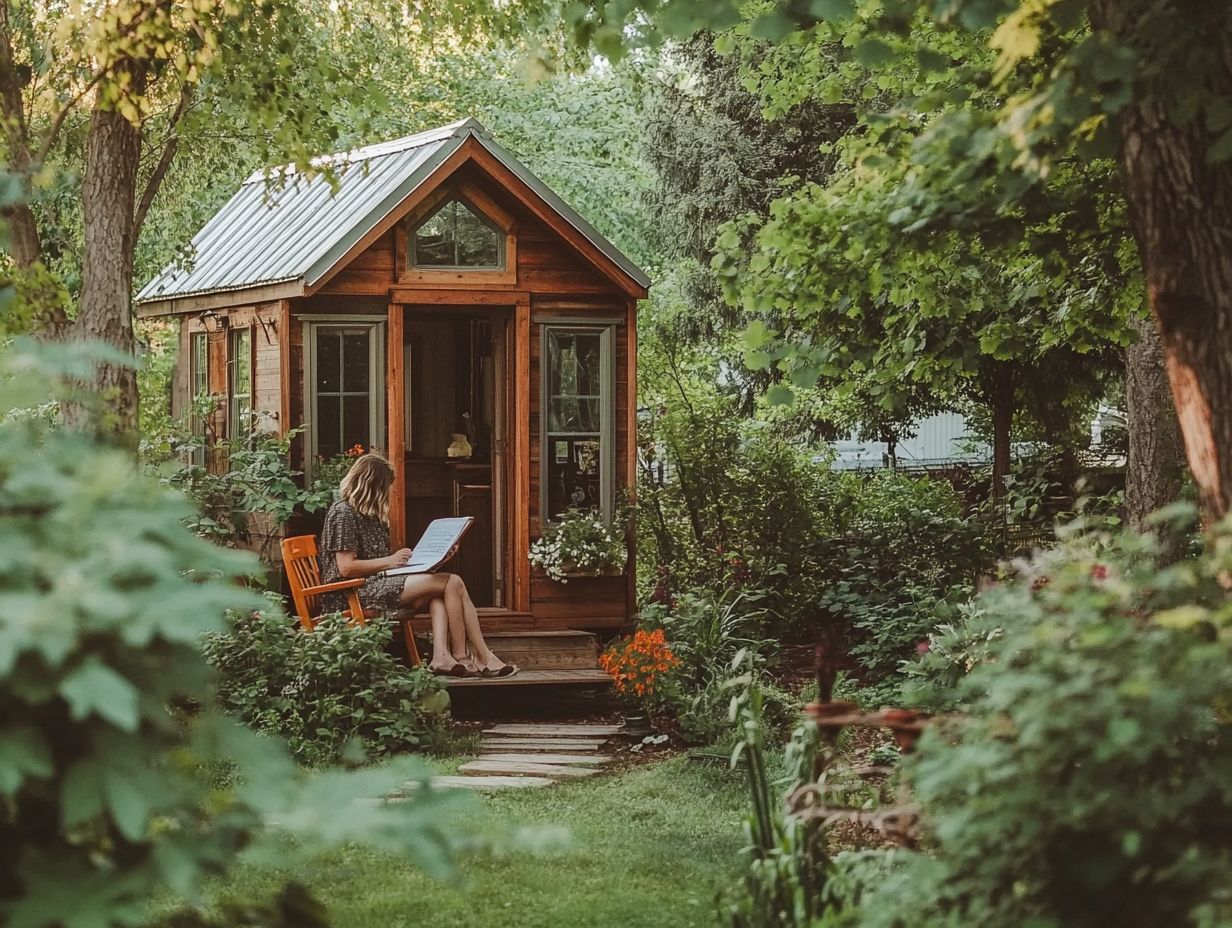
In most cases, yes. Building permits are required for all permanent structures, including tiny houses. Don t wait! Research the specific requirements for building a tiny house in your area, especially in states like Colorado and California.
Can you legally live in a tiny house full-time?
The legality of living in a tiny house full-time varies by location. Some areas impose restrictions on the minimum square footage for a permanent residence, while others allow tiny houses to be designated as accessory dwelling units. Research your local zoning laws before making a decision.
Are there specific safety requirements for tiny houses, especially regarding the International Residential Code?
Yes, tiny houses must meet all safety requirements for permanent structures, including having a proper foundation, adequate ventilation, and electrical wiring up to code. Consult with a professional builder to ensure your tiny house meets all necessary safety standards while promoting sustainability.
Do you need insurance for your tiny house, including options from advocacy groups focused on the tiny house movement?
Yes, tiny houses should be insured just like any other permanent structure. However, insurance options may be limited for tiny houses, so it s essential to research and understand the coverage options available.
What are the tax implications of owning a tiny house?
Tiny house owners, like traditional homeowners, must pay property taxes. However, these taxes might be lower because of the smaller size and reduced value determined by the tax authorities.
It’s crucial to understand the tax laws for tiny houses. These laws can vary by state, including places like Georgia and Oregon, and knowing them can save you money and time!

